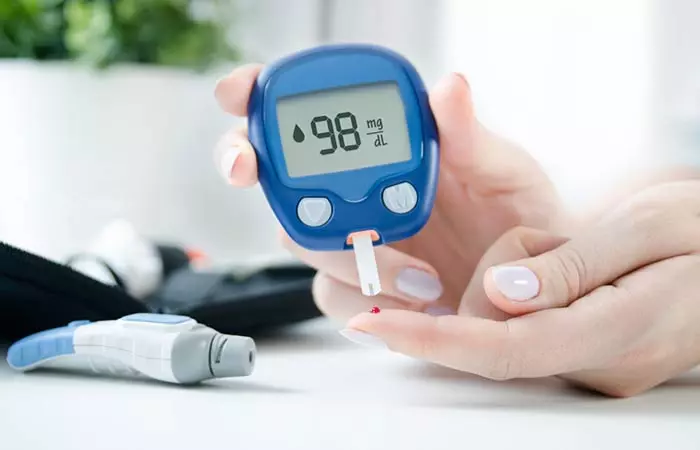Alpha-lipoic acid (ALA) may help shield you from the harmful effects of everyday pollution. It eliminates free radicals and prevents them from doing any damage. Alpha-lipoic acid may prevent cancer, inflammation, and diabetes before they begin to take hold and wreak havoc on your body. ALA may also improve your vision. The article discusses the importance of ALA, its recommended dosage, and its potential side effects. Take a look.
What Is Alpha Lipoic Acid?
ALA is one antioxidant that is commonly found in plant foods. We humans also synthesize a small amount of ALA, and this amount drastically increases when we follow a healthy diet regularly. In fact, the natural form of this acid is lipoic acid (the one found in plants and synthesized in our bodies). When this acid is prepared in the lab, it is called alpha lipoic acid. What Are Its Benefits? It can help reduce the risk of cancer, arthritis, inflammation, heart disease, Alzheimer’s, and diabetes. It can also assist in weight loss, reducing migraine, and improving eye, brain, and liver function. Who Can Use It? It can impact blood sugar levels; hence, it is advised to use it under medical supervision only. How Often? Daily dosage may vary from 50 to 1800 mg depending on health issues and medical instructions. Caution Pregnant and breastfeeding women, individuals with thiamine deficiency, and those on other medications like insulin should avoid it.
But why are we even reading about it? Why is it important? To know that, you need to understand the science behind free radicals.
ALA – The Free Radical Scavenger
The science is simple. Our bodies are made of atoms. And atoms are surrounded by electrons, in layers called shells. Each shell has a set number of atoms. If a shell is vacant, the atom bonds with other atoms to get electrons. Such incomplete atoms are called free radicals. They are unstable and seek other atoms to bind with. In the process, they set off a chain reaction that is called oxidative stress. Oxidative stress is a killer. It damages the body’s cells and is responsible for most of the deadly diseases that plague humanity today. Some of them include cancer, arthritis, inflammation, heart disease, Alzheimer’s,i A condition in which a person loses memory and other essential mental abilities due to the degradation and death of brain cells. diabetes, cataractsi A slow, progressive eye condition that turns the eye lenses cloudy, leading to blurred vision. , and other genetic diseases. Antioxidants lend electrons to these incomplete atoms and help them stabilize. They stop oxidative stress. ALA is an antioxidant. In fact, we can say it is the most powerful of all antioxidants. This is because it is both water and fat-soluble – which means it can be properly absorbed by either of them, unlike other antioxidants like vitamins A, C, and E. This is what makes ALA unique. ALA also binds with heavy metals in the body (like mercury, arsenic, and lead) and flushes them out of your system. Heavy metals cause deadly diseases and, in worst cases, even death. ALA stops all of this. Which is why it is important you know about it. If you pay some attention, ALA can save your health and life in several ways. We will discuss all of them now.
What Are The Benefits Of Alpha Lipoic Acid?
1. ALA Aids Diabetes Treatment
ALA is a natural neuroprotective that protects the cells and neurons involved in hormone production, and this is how it can aid diabetes treatment and prevent its related complications. Studies show how this antioxidant can help prevent diabetic neuropathy, a common diabetes complication (1). ALA can lower blood glucose levels, thereby alleviating diabetes complications. There is strong evidence that ALA, even in the supplemental form, can help with type 2 diabetes (2). In addition, it can also protect the retina from damage that might occur in certain diabetes individuals.
2. Fights Inflammation
Given it is a potent antioxidant with anti-inflammatory properties, ALA can fight inflammation in the body. More interestingly, it even restores the levels of other antioxidants like vitamins C and E (3). The antioxidant was also found to reduce inflammation in several patients with heart disease, thereby supporting heart health as well.
3. Prevents Cancer
As per studies, ALA can prevent breast cancer – thanks to the strong influence it has on cell growth. It even induces programmed cell death in cancer cells. ALA also inhibits a compound called matrix metalloproteinase that breaks down the cell structure and allows cancer cells to proliferate. In animal studies, daily treatment with ALA had halted cancer growth – and this makes ALA all the more promising as an effective cancer treatment (4).
4. May Help With Weight Loss
Some research states that ALA may help with weight loss. Obese patients treated with the antioxidant showed some weight loss compared to those on a placebo (5). However, we need more research here.
5. Promotes Liver Health
ALA was used to treat liver disease in various instances, and the results were positive. Whether it was alcohol-induced liver damage or heavy metal poisoning, ALA aided treatment and offered relief from symptoms (6). Even liver cells damaged by excess polyunsaturated fatty acids undergo regeneration, thanks to ALA (7).
6. ALA Improves Vision Health
Oxidative stress can damage the eye nerves and lead to long-term vision ailments. But thanks to the antioxidant properties of ALA, these can be prevented. ALA was used in several occasions to prevent retinal damage, cataracts, and even macular degenerationi An eye condition that deteriorates the macula (a part of the retina), causing blurred central vision. . Studies show that ALA can even be used to prevent diabetic retinopathyi Vision-related side effect of diabetes in which the retina’s blood vessels get damaged, leading to blindness in some cases. (8).
7. Can Treat Migraines
Trials have shown that ALA supplementation could treat migraines and reduce the frequency of migraine attacks (9). Another study recognizes ALA as a preventative treatment for migraines (10).
8. Assists In Muscle Growth
ALA achieves this in different ways. ALA has an insulin-mimicking effect. It increases glucose uptake in a way that allows more of glucose to travel to the muscle cells and only some of it to the fat cells. This way, ALA lowers blood sugar levels as well – thereby creating a conducive atmosphere for fat burning.
9. May Help Treat Fibromyalgia
ALA is known to reduce diabetic nerve pain, which is why it might also be effective in reducing pain in individuals suffering from fibromyalgiai A condition characterized by widespread body pain and may cause fatigue and affect sleep, memory, and mood. .
10. Promotes Brain Health
ALA seamlessly passes through the blood-brain barrier and helps protect the brain tissue. It can be used to prevent and even treat neuron damage, memory loss, and impairment in older adults and even improve cognitive functioning – thanks to its antioxidant activity (11). Gail Rae-Garwood, a blogger, discusses her long history of using ALA. She writes, “My experience was that I took Alpha Lipoic Acid for years and barely felt the neuropathy (i).” However, she also has pancreatic cancer and, as per her personal research, found antioxidants may reduce the efficacy of chemotherapy. Hence she concludes ALA may not be the best for her, but she suggests talking to a doctor about using it for neuropathy.
11. Boosts Skin Health
Since ALA fights inflammation, it can work wonders in treating acne. In fact, some popular acne-fighting creams have ALA as their primary ingredient – that explains a lot, doesn’t it? There is some evidence that ALA might also heal scars. The acid enables the skin to activate certain collagen-digesting enzymes that work to break down the damaged collagen, which is what constitute scars and wrinkles and even fine lines. These are the ways the potent antioxidant properties of ALA can make your life better. All in all, there are many wholesome benefits of alpha lipoic acid for the skin. So, how do you take this power antioxidant? Simple – consume more of the foods that have it. The foods containing ALA include:
Spinach Broccoli Red meat (including organ meat) Brussels sprouts Beetroots Tomatoes Peas Brewer’s yeast
What Is The Recommended Dosage Of ALA?
The ideal dosage varies from person to person. It depends on several factors. But from a general sense, this is how the average dosing of ALA looks like:
If you are a healthy adult who wants to take ALA for its antioxidant benefits, your daily dosage is 50 to 100 milligrams. In the case of diabetes, your dosage is 600 to 800 milligrams (divided into two doses). And in the case of more severe diabetes (like diabetic neuropathy), you would need 600 to 1,800 milligrams.
In case you are taking ALA for any specific health issue, we suggest you consult your doctor or health care provider as well. But hold on. What happens if you exceed the dosage? Anything to keep in mind?
What Are The Side Effects Of ALA?
Taking too much alpha lipoic acid can lead to undesirable conditions – as discussed below:
Issues With Pregnancy And Breastfeeding
We don’t have enough information here. Hence, stay safe and avoid ALA if you are pregnant or breasfeeding.
Possibly Unsafe For Children
ALA might cause severe issues in children and infants if taken in large amounts. A few such symptoms include vomiting, unconscious, and even seizures. Please consult a pediatrician if your child exhibits any of these symptoms.
Diabetes
Yes, ALA is beneficial for diabetes. Which is why the dosages of your diabetes medications need to be adjusted accordingly in case you are making ALA a part of your regular routine. Please talk to your doctor before you consume ALA for this purpose.
Issues During Surgery
ALA can interfere with blood sugar control during and post surgery. Hence, stop its intake at least two weeks before a scheduled surgery.
Issues With Thiamine Deficiency
Don’t take ALA if you have thiamine (vitamin B1) deficiency as it might cause serious problems. The same holds true if you take too much alcohol, as excess alcohol also reduces levels of thiamine. (In fact, if you consume excess alcohol, we suggest you cut back on that first!)
Interference With Thyroid Disease Treatment
If you have an underactive or overactive thyroid, stay away from ALA (unless approved by your doctor). ALA might interfere with thyroid medications and treatment.
A Note On ALA Supplements
ALA supplements are a safe way to ensure you get enough levels of this antioxidant. This is because though common foods contain this compound, they only do so in low amounts. Unless you regularly take multiple servings of fruits and veggies, you may not be getting adequate levels of ALA. Make sure you consult your nutritionist or doctor before going for supplements. To enhance the effectiveness of alpha lipoic acid, you need to take it at the right time. Check out the next section to know more.
Best Time To Take Alpha Lipoic Acid
It is generally recommended to take ALA with meals, particularly with food containing fats, to improve its absorption. This improves its effectiveness in various ways:
Blood Sugar Management: When utilizing ALA to regulate blood sugar levels, it is typically taken with the largest meal of the day to help moderate post-meal blood sugar spikes. Antioxidant Benefits: If you want to use ALA as an antioxidant to combat oxidative stress, try taking it with a meal to allow it to work effectively throughout the body. Improved Nerve Health: For those using ALA to support nerve health, especially in cases like diabetic neuropathy, it is advisable to consult a healthcare provider for specific treatment guidelines that may include varied timing.
And tell us how this post has helped you. Simply leave a comment in the box below. Can alpha-lipoic acid damage kidneys? Faith Krisht, MS, RDN is of the opinion that alpha-lipoic acid does not damage the kidneys. She says, “ It has renal-protective effects and can improve kidney health. This is due to its favorable effects on blood glucose, blood pressure, anti-inflammatory properties, decreasing oxidative damage, and reducing nephron cell death.” Does alpha-lipoic acid lower BP? Faith says, “The current research shows that supplementing with alpha-lipoic acid can be beneficial for lowering blood pressure. A recent review article shows that it is helpful in lowering both diastolic and systolic blood pressure.” Does alpha-lipoic acid reverse aging? Faith says, “Alpha-lipoic acid is an antioxidant and it is well-documented that antioxidants can be beneficial in reversing and slowing down aging. This is mainly done by mitigating oxidative damage to cells. Some early evidence shows alpha-lipoic acid may be helpful for the following age-related conditions: neurodegeneration, metabolic disorders, different cancers, nephropathy, infertility, and skin senescence.” How to take ALA? You can take it through foods or even supplements. In case you are particular about getting the adequate amounts of ALA, we recommend you go for supplements as well. Consult your health care provider, though. What is the difference between alpha lipoic acid and R-lipoic acid? R-lipoic acid is nothing but the natural form of lipoic acid, found in plant foods and also synthesized by the body. S-lipoic acid is the unnatural form. Where can you buy ALA? You can go for the plant foods listed in this post. Or you can go for supplements as well. You can get your supplements here. Why does ALA make your urine smell? This is one harmless side effect of ALA. If you find it causing other issues (like burning), do consult your doctor. What is the best time of day to take alpha-lipoic acid? Anecdotal evidence suggests that it is best to consume alpha-lipoic acid right in the morning on an empty stomach for better absorption. Does alpha-lipoic acid make you sleep better? There are no studies that prove that alpha-lipoic acid promotes better sleep. Does alpha-lipoic acid cause bone loss? No. Studies have shown that alpha-lipoic acid is instead good for bone health as it helps to reduce oxidative stress and inflammation, which in turn helps to prevent bone loss (12). Does alpha-lipoic acid assist mitochondrial function? Yes. The high antioxidant content in alpha-lipoic acid supports mitochondrial function and improves its performance(13).
Illustration: Alpha Lipoic Acid: Top 11 Benefits Of The Power Antioxidant + Dosage
Discover the amazing benefits of alpha-lipoic acid. Learn how it can help improve your health and well-being. Check the following video to learn more!













